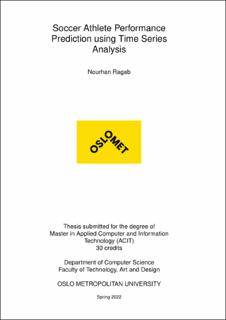| dc.description.abstract | Regardless of the sport you prefer, your favorite athlete has almost certainly
disappointed you at some point. Did you jump to a conclusion and
dismissed it as "not their day"? Or, did you consider the underlying causes
for their poor performance on that particular day? Under-performance can
have big consequences in team sports such as soccer and affect the entire
team dynamic. Basal needs like sleep quality and wellness parameters such
as mood, fatigue and muscle soreness can affect an athlete’s performance.
In this context, the practice of using wearable sensor devices to quantify
athlete health and performance is gaining popularity in sports science. This
thesis aims to predict how ready a soccer athlete is to train or play a match
based on the subjectively reported wellness parameter readiness to play,
collected by the PMSys athlete performance monitoring system [34, 33, 17].
Even though women’s soccer is receiving increasingly more attention, with
a recent record in game day attendance marking over 90.000 spectators [50],
the vast majority of soccer studies are conducted on male athletes. In this
sense, we explore a relatively new domain using the PMSys dataset, which
is from two Norwegian elite female soccer clubs over the period of 2020
and 2021. We predict readiness by utilizing the Long short-term memory
(LSTM) method and the Tsai [45] state-of-the-art deep learning library. We
develop a framework that is able to handle univariate multistep time series
prediction and easily allows for further development. The experimental
results show that it is possible to train a Machine Learning (ML) model
on a team and predict a single player’s readiness, detecting detect peaks
closely to actual values. It is possible to use the previous week to predict
the upcoming day, or even the upcoming week, as the model does not
require much data to get started. The model works well on data from the
entire team for a shorter period than a larger set of data for a longer period,
which allows the teams to quickly start using the system with existing data.
Hyperparameters are easily configurable and can be changed as required to
optimize the model. Our results can be used for evidence based decisions,
such as benching the team star so she doesn’t get injured for the rest of the
season. As a first milestone, this framework will be incorporated in PMSys
and used in the Norwegian the elite female soccer league, Toppserien, but
the overall approach can be part of a standardized athlete performance
monitoring system that is globally used by athletes in all sports. | en_US |
